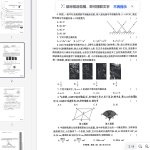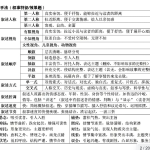湖南省长沙市雅礼中学2021-2022学年高三上学期12月月考(四)英语试题
雅礼中学2022届高三月考试卷(四)
本试题卷共10页。时量120分钟。满分150分。
注意事项:
1 . 答卷前, 考生务必将自己的姓名、准考证号填写在答题卡上。
- 回答选择题时, 选出每小题答案后, 用铅笔把答题卡上对应题目的答案标号涂 黑。如需改动, 用橡皮擦干净后, 再选涂其他答案标号。回答非选择题时, 将答案写在答 题卡上, 写在本试卷上无效。
第一部分听力(共两节, 满分30分)
做题时, 先将答案标在试卷上。录音内容结束后, 你将有两分钟的时间将试卷上的 答案转涂到答题卡上。
第一节(共5小题;每小题1. 5分, 满分7. 5分)
听下面5段对话。每段对话后有一个小题, 从题中所给的A、B、C三个选项中选出 最佳选项。听完每段对话后, 你都有10秒钟的时间来回答有关小题和阅读下一小题。 每段对话仅读一遍。
例:How much is the shirt?
- £ 19. 15. B. £9. 18. C. £9. 15.
答案是C.
- Who was trapped in the lift?
- Some workers. B. Megan. C. Megan’s sister.
- How did the woman get there?
- By car. B. By bus. C. By bike.
- Why does the man make this call?
- To cancel his travel. B. To book his ticket. C. To change the leaving date.
- What are the speakers talking about?
- Staying home. B. Reducing air pollution. C. Enjoying fresh air.
- What makes the man appreciate his dog?
- The dog protects his house.
- The dog is easy to take care of.
- The dog helps him get exercise.
第二节(共15小题;每小题1. 5分, 满分22. 5分)
听下面5段对话或独白。每段对话或独白后有几个小题, 从题中所给的A、B、C三 个选项中选岀最佳选项。听每段对话或独白前, 你将有时间阅读各个小题, 每小题5秒 钟, 听完后, 各小题将给出5秒钟的作答时间。每段对话或独白读两遍。
听第6段材料, 回答第6、7题。
- What are the speakers mainly discussing?
- Smoking. B. Building styles. C. The use of balconies.
- What will the speakers do tonight?
- Cook together. B. Go out. C. Dance on the balcony.
听第7段材料, 回答第8至10题。
- Why is the man not certain of the job?
- His education is not enough.
- Others are more suitable than him.
- He doesn’t have enough work experience.
- According to the woman, what is important for work?
- Strong will and hard work.
- Good knowledge with work experience.
- The ability to put knowledge to practical use.
- What is the man’s opinion about the interviewers?
- They have good experience.
- They are experts in the field.
- They are knowledgeable but proud.
听第8段材料, 回答11至13题。
- What’s wrong with the woman’s father?
- He had a heart disease.
- He had a car accident.
- He had an operation.
- How long should the woman’s father stay in hospital totally?
- For three days. B. For four days. C. For seven days.
- What is the probable relationship between the speakers?
- Boss and employee. B. Teacher and student. C. Husband and wife.
听第9段材料, 回答14至17题。
- Why is the man worried?
- He stepped on his dog. B. He hasn’t finished his paper.
- He has to wash some jeans.
- What was the immediate cause of the power failure?
- Mom’s use of the washing machine.
- Jack’s turning on the microwave oven.
- Dad’s surfing on the Internet for a long time.
- What does the man find in the kitchen?
- A flashlight. B. A lighter. C. A candle.
- What does the woman suggest doing in the end?
- Holding a candlelight dinner.
- Going out to buy some batteries.
- Checking the problem tomorrow.
听第10段材料, 回答18至20题。
- Where does most of the wood used to build houses in the United States come from?
- The western part of the country.
- The eastern part of the country.
- The southern part of the country.
- How many different plants of the Amazon rain forest provide medicines for native people?
- More than 1, 000. B. More than 10, 000. C. More than 1, 000, 000.
- According to the speaker, what’s the most important function of trees?
- Offering food such as fruits and nuts.
- Creating good environmental conditions.
- Providing a fuel for heating and cooking.
第二部分 阅读(共两节, 满分50分)
第一节 (共15小题;每小题2. 5分, 满分37. 5分)
阅读下列短文, 从每题所给的A、B、C、D四个选项中选出最佳选项。
A
If you’re from other countries and mention Australia, people around you will probably think of the beach. We Australians have made adoration of the beach a national sport. To make the most of your next coastal camping journey, take note of these tips.
Know your H2O
Water is everywhere, but not a drop to drink. Even though you’re surrounded by water, you’ll need to pack a proper supply of H2O of your own. Seawater can’t be consumed. Your body will be losing water from the wind and the sun, let alone the dehydration(脱水)that will occur if you’re beating your mates at beach volleyball or involved in after-dark drinking activities of the non-H2O variety.
The trick here is to observe your urine(小便). If it’s clear you’re doing OK. If it’s yellow you’re dehydrated. You need to reach for your bottle. If it’s orange or brown, stop what you’re doing and drink a bottle of water.
Be aware of private land
There are no privately owned beaches in Australia: beaches are public places for all to enjoy. But above the high tide line(涨潮线)is another matter. Someone owns the land, which means there are laws that state how we access the land and what we do when we get there. In many places, it’s not legal to camp directly there. Make sure you know what’s permitted and what isn’t at your chosen seaside destination, and always respect private land.
Stay fire safe
In Australia, summer’s favorite bedfellow is fire. State laws and local governments all have different rules you’ll need to consider, not to mention the various fire services. Always check for total fire bans, and always respect them to the letter. In general, fires are not permitted on beaches within national parks, so it’s best to look for signs and check with the local office. If it is legal, remember that a fire can smolder(闷燃) under sand for a long time and potentially injure the next visitors. Put it out with water, not sand. Indeed, this is good practice at any campsite, not just the beach.
- What should you do when your urine is yellow?
- Lie down and do nothing. B. Drink some water.
- Have a non-H2O drink. D. Do some exercise.
- What should you keep in mind when you’re above the high tideline?
- There are lots of private beaches.
- There’s no access to the beaches.
- The land may not be open to the public.
- The campsites are not necessarily satisfactory.
- What can be learned about fires on beaches in national parks?
- They are permitted on rare occasions.
- They are allowed only in summer.
- They are easily put out with sand.
- They are often left to smolder.
B
In 1926, US automaker Henry Ford shortened its employees5 workweek from sb eight-hour days to five, with no pay cuts. It was something workers and labor unions had been calling for. Ford wasn’t responding to worker demands; he was being a businessman. He expected increased productivity and knew workers with more time and money would buy and use the products they were making. It was a way of encouraging consumerism and productivity to increase profits, and it succeeded.
Since standardization of the 40-hour workweek in the mid-20th century, everything has changed but the hours. If anything, many people are working even longer hours, especially in North America. This has a severe influence on human health and well being, as well as the environment. Until the Second World War, it was common for one person in a family, usually the oldest male, to work full-time. Now, women make up 42% of the world’s full-time workforce. Technology has made a lot of work unnecessary, with computers and robots doing many tasks previously performed by humans.
Well into the 21st century, we continue to work the same long hours as 20th century laborers, using up ever more of Earth’s supply to produce more goods that we must keep working to buy, use and replace in a seemingly endless cycle of hard work and consumption. It’s time to pause and consider better ways to live like shifting from fossil-fueled lifestyles with which our consumer-based workweeks are connected.
The UK think tank, New Economics Foundation, argues that a standard 21-houi workweek would address a number of interconnected problems” overwork, unemployment, over-consumption, high carbon emissions, low well-being, and the lack of time to live sustainably, to care for each other, and simply to enjoy life”.
Economic systems that require constant growth on a finite (有限的)planet don’t make sense. Its time for a change in our economic thinking.
- Why did Ford decide to shorten the workweek?
- To cut workers5 pay.
- To make more profits.
- To respond to worker demands.
- To meet labor unions5 requirements.
- What change in the workforce happened after World War II ?
- More women worked full-time.
- The number of laborers decreased.
- Technology enabled people to work shorter hours.
- It was unnecessary for a family’s oldest male to work.
- What can we infer from the third paragraph?
- Longer working hours means better consumption ability.
- The 21st century sees the longest working hours in history.
- The cycle of hard work and consumption should be changed.
- Pausing our way of living can change the present workweek.
- New Economics Foundation thinks a 21-hour workweek will .
- increase unemployment B. cause various problems
- challenge the economic growth D. encourage people to enjoy life
C
Among the many holiday traditions are live concerts featuring skilled musicians. These gifted performers can often play with such ease that it is easy to underestimate (低估)the countless hours that the musicians have practiced.
But could there be more to mastering music? Is there, as some have suggested, a developmental period early in life when the brain is especially receptive(乐于接受的)to musical training? The answer, according to a new research published in the journal Psychological Science, is probably not.
While the new study supports the idea that an early start is associated with higher levels of musical skills and achievement in adulthood, the underlying reasons for this may have more to do with family influences一such as genetic factors and an encouraging musical family environment一along with accumulating more total practice time than those who start later in life.
To make clear these effects, Laura Wesseldijk, a researcher at the Karolinska Institute in Sweden, and her colleagues recruited(招募)310 professional musicians from various Swedish music institutions. The researchers also used data from an existing research project, the Study of Twin Adults: Genes and Environment (STAGE). Participants from both studies were tested on musical aptitude(天资)and achievement. They also answered a series of questions that measured how often they practiced and when they began musical training. The STAGE data also provided genetic information on its participants.
By comparing the results from these two independent studies, the researchers were able to show that an earlier starting age is associated with musical aptitude, both in amateurs and professional musicians, even after taking accumulated practice time into account. They then evaluated starting age in a manner that accounted for the genetic data from the STAGE study. The results indicate that genetic factors—possibly related to musical interest and talent一have a significant influence on the age when individuals start music practice and their future musical aptitude.
A possible explanation for these results could be that children who display more talent in a particular field, such as music, are encouraged to start practicing earlier. Another possibility is that a musically active, interested, and talented family provides a musical environment for the child, while also passing on their genetic tendency to engage in music.
- What is often ignored when listening to music, according to the first paragraph?
- Skilled musicians are all talented.
- Live concerts are holiday traditions.
- Gifted performers often play with great ease.
- Musicians need to practice quite a lot to be skilled.
- What might the new study in the journal Psychological Science say no to?
- An early start to practicing music is good for musicians.
- It is easier for people to practice music when they are very young.
- Successful musicians often start their musical training at a young age.
- Some people are not suited to practicing music due to their brain structure.
- What influences one’s future musical aptitude most, according to the results from the two studies?
- Genetic factors. B. Family support.
- The learning environment. D. The starting age to practice.
- What is the last paragraph mainly about?
- Why music has to be practiced early in life.
- Why a musical environment is important for the child.
- Why musicians are encouraged to start practicing earlier.
- Why an earlier starting age is associated with musical aptitude.
D
A robot with a sense of touch may one day feel “pain”, both its own physical pain and sympathy for the pain of its human companions. Such touchy-feely robots are still far off, but advances in robotic touch-sensing are bringing that possibility closer to reality.
Sensors set in soft, artificial skin that can detect both a gentle touch and a painful strike have been hooked up to a robot that can then signal emotions, Asada reported February 15 at the annual meeting of the American Association for the Advancement of Science. This artificial “pain nervous system”, as Asada calls it, may be a small building block for a machine that could ultimately experience pain. Such a feeling might also allow a robot to “sympathize” with a human companion’s suffering.
Asada, an engineer at Osaka University, and his colleagues have designed touch sensors that reliably pick up a range of touches. In a robot system named Affetto, a realistic-looking child’s head, these touch and pain signals can be converted to emotional facial expressions.
A touch-sensitive, soft material, as opposed to a rigid metal surface, allows richer interactions between a machine and the world, says neuroscientist Kingson Man of the University of Southern California. Artificial skin “allows the possibility of engagement in truly intelligent ways”.
Such a system, Asada says, might ultimately lead to robots that can recognize the pain of others, a valuable skill for robots designed to help care for people in need, the elderly, for instance. But there is an important distinction between a robot that responds in a predictable way to a painful strike and a robot that’s capable of approximating an internal feeling, says Damasio, a neuroscientist also at the University of Southern California. A robot with sensors that can detect touch and pain is “along the lines of having a robot, for example, that smiles when you talk to it, ” Damasio says. “While that’s an interesting development, it’s not the same thing as a robot designed to compute some sort of internal experience, ” he says.
- What do we know about the “pain nervous system”?
- It is named Affetto by scientists.
- It is a set of complicated sensors.
- It is made up of small building blocks.
- It combines sensors and artificial skin.
- What does the underlined word “converted” in Paragraph 3 probably mean?
- Delivered. B. Translated. C. Attached. D. Adapted.
- What does Damasio consider as an interesting development?
- Robots can talk to human beings.
- Robots can give unforeseeable responses.
- Robots can detect pain and respond accordingly.
- Robots can compute some sort of internal feelings.
- What can be the best title of the text?
- Human feelings can be felt
- Machines become emotional
- Robots inch closer to feeling pain
- Robots will touch the human heart
第二节 (共5小题;每小题2. 5分, 满分12. 5分)
阅读下面短文, 从短文后的选项中选出可以填入空白处的最佳选项。选项中有两 项为多余选项。
When it comes to hobbies and career, all of us have our own stories. As a little girl, my favorite thing to do was read—same as today. So I figured I’d be a librarian when I grew up. 36_______ The library had a two-book limit, but she knew I’d blow through those in just a few days, so she always let me check out a big stack(摞).
Time passed quickly and I was in fourth grade. Our school librarian, Mrs. Ketelsen, sent some poems I’d written about dinosaurs to Highlights magazine. 37________ At the University, though majoring in journalism, I quickly learned that I did not want to be a newspaper reporter. 38 ________ It amuses almost everyone who knows me and thinks I’m outgoing. (I am, but only with people I know!) So I was thrilled when I was selected for a summer internship(实习)at Reader’s Digest.
Ten years after that, I came back to RD to work as an editor. 39________ I’ve worked at other magazines too, but I’ve spent most of my career here, reading magazines, newspapers, websites, and books for stories we could condense(简缩);writing articles; even choosing jokes.
40 _________”The Tractor War”(page 92) takes me home to the Midwest. ” Something to Sneeze At”(page 47) reminds me of all the sneezing I did when I moved to New York City and was suddenly allergic(过敏的)to grasses and trees. “Pet Besties”(page 48) makes me think about my cats, brothers Reggie and Smokey, who are sitting together at the window as I write. I relate to lots of our stories this month, and I hope you love them. Enjoy!
- It was a long road home.
- My first published writing!
- I’m shy about interviewing people.
- Here are some stories I have read recently.
- My dream of becoming a librarian encouraged me.
- This issue seems to be the perfect one to introduce myself to you all.
- Our town librarian, Mrs. Tonne, was really important to me becoming me.
第三部分 语言运用(共两节, 满分30分)
第一节 (共15小题;每小题1分, 满分15分)
阅读下面短文, 从每题所给的A、B、C、D四个选项中选出可以填入空白处的最佳选项。
Sometimes, life as a big sister just doesn’t seem fair. I was five years old, and my sister Helen was 41 . Every time we did something that we were not 42 to do, I got into more trouble. I couldn’t 43 it anymore! So, I packed my things and decided to leave forever. My mother asked if I was running away and I told her yes. She was not nearly as 44 by this as I felt she should be. She looked at me and said, “Are you going to Grandma Sylvia’s?” I couldn’t 45 she could figure this out. Without 46 her, I went out. I was so 47 that I didn’t realize that my mother was about 20 metres behind me, following and 48 concerned citizens away.
Finally, I got to Grandma’s apartment. Before I even knocked, the door opened. My grandma welcomed me but said I was certainly not 49 there forever. And I realized my mother had called ahead and I had been 50 . When my grandma went to get me some juice, my mother arrived and kindly asked why I had run away. After listening to my 51 , my mother said to me, “Sweetheart, if it’s 52 for you to live with Helen? tomorrow morning I will call the orphanage and we’ll send her away. ” I knew what an orphanage was. I started to cry, and I begged her, “Don’t send my sister away to an orphanage My mother reluctantly agreed that we would all go home and give it another 53 .
And in those years to come, Helen and I would share laughter and tears. Sometimes, however, we would 54 . And to this day, if I turn to my mother, she always answers in the same way, “You had your 55 , sweetheart. ”
- A. stronger B. calmer C. cleverer D. younger
- A. supposed B. prepared C. trained D. qualified
- A. hide B. stand C. afford D. oppose
- A. optimistic B. bored C. upset D. sensitive
- A. expect B. predict C. pretend D. believe
- A. greeting B. answering C. informing D. noticing
- A. focused B. straightforward C. busy D. exhausted
- A. putting B. taking C. waving D. scaring
- A. working B. learning C. living D. sitting
- A. turned off B. ignored C. brought up D. betrayed
- A. report B. complaint C. account D. operation
- A. uncertain B. vital C. hard D. fragile
- A. try B. hope C. memory D. impression
- A. break down B. apologize C. get along D. fight
- A. point B. chance C. dream D. plan
第二节 (共10小题;每小题1. 5分, 满分15分)





